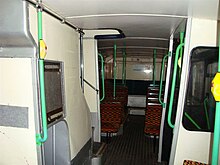MCW Metrobus
| MCW Metrobus | |
|---|---|

Preserved Greater Manchester Passenger Transport Executive MCW Metrobus Mk1 in October 2009 during the SELNEC 40 event at Sportcity, Manchester
|
|

Arriva Buses Wales Metrobus Lower Saloon Interior
|
|
| Overview | |
| Manufacturer | Metro Cammell Weymann |
| Body and chassis | |
| Doors | 1, 2 or 3 |
| Floor type | Step entrance |
| Powertrain | |
| Engine |
Gardner 6LXB Gardner 6LXCT Gardner 6LXDT Rolls-Royce Eagle 220 Mk III Cummins LT10 Cummins LTA10-B282 |
| Transmission |
Voith DIWA851 Voith DIWA851.2 Voith DIWA854 Voith DIWA864G Maxwell |
| Dimensions | |
| Length | 9.7m, 11.0m, 11.3m or 12.0m |
| Width | 2.5m |
| Height | 4.38m (For standard height) |
The MCW Metrobus is an 2-axle and 3-axle double-decker bus model manufactured by Metro Cammell Weymann (MCW) between 1977 and 1989, with over 4,000 examples built. The original MkI model was superseded by the MkII model (which had a symmetrical windscreen with an arched top) in 1981, although production of the original MkI continued for Greater Manchester Transport and London Transport until 1983 and 1985 respectively. The Metrobus was conceived as an integral product manufactured completely by MCW, but Alexander and Northern Counties also bodied some examples.
MCW planned to produce a single-decker version but this was not to come into production.
In the United Kingdom, the Metrobus was mainly used in the metropolitan areas, especially London, West Midlands and Greater Manchester.
London Transport purchased 1,440 MkI examples between 1978 and 1985, numbering them M1 to M1440. Two MkII prototypes were delivered to London Transport as M1441 and M1442 in 1984, but there were no further orders. In 1987 and 1988, 14 secondhand Metrobuses were purchased from Greater Manchester PTE, West Yorkshire PTE and Busways. London Transport's low-cost subsidiary Harrow Buses leased 29 new MkII Metrobuses in 1987, but had to return them to their lessor three years later. London Transport's Metrobuses were the mainstay of the double decker fleet between 1987 and privatisation in 1994, when most of them passed to seven of the new operators.
...
Wikipedia
